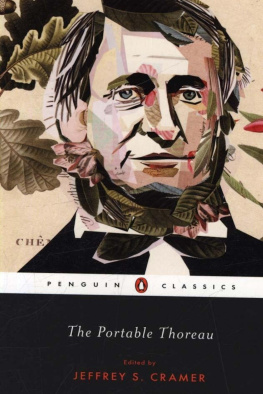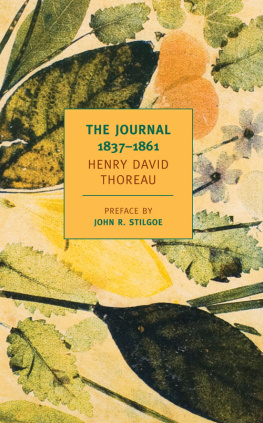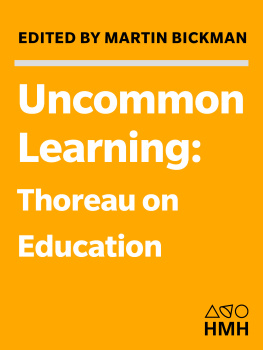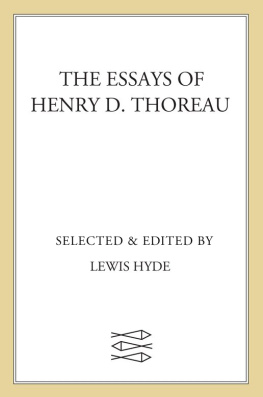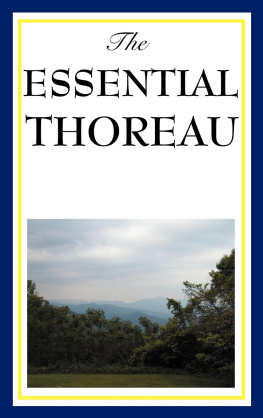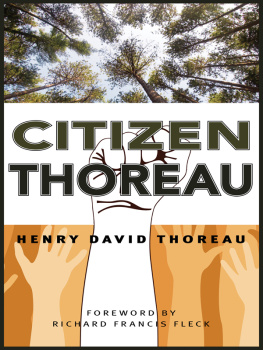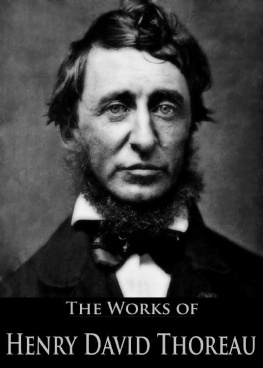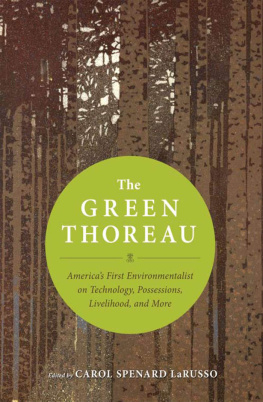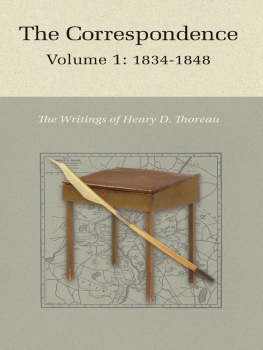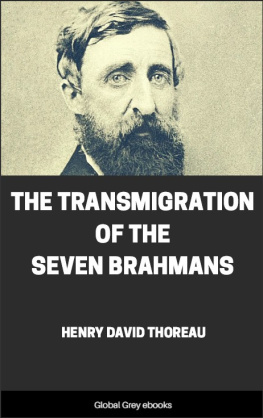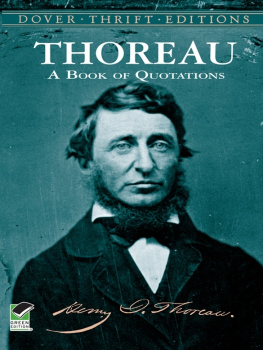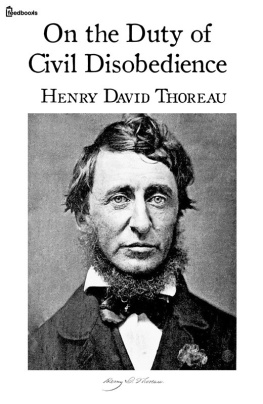Henry David Thoreau - The Portable Thoreau
Here you can read online Henry David Thoreau - The Portable Thoreau full text of the book (entire story) in english for free. Download pdf and epub, get meaning, cover and reviews about this ebook. year: 2012, publisher: Penguin, genre: Art. Description of the work, (preface) as well as reviews are available. Best literature library LitArk.com created for fans of good reading and offers a wide selection of genres:
Romance novel
Science fiction
Adventure
Detective
Science
History
Home and family
Prose
Art
Politics
Computer
Non-fiction
Religion
Business
Children
Humor
Choose a favorite category and find really read worthwhile books. Enjoy immersion in the world of imagination, feel the emotions of the characters or learn something new for yourself, make an fascinating discovery.
- Book:The Portable Thoreau
- Author:
- Publisher:Penguin
- Genre:
- Year:2012
- Rating:3 / 5
- Favourites:Add to favourites
- Your mark:
- 60
- 1
- 2
- 3
- 4
- 5
The Portable Thoreau: summary, description and annotation
We offer to read an annotation, description, summary or preface (depends on what the author of the book "The Portable Thoreau" wrote himself). If you haven't found the necessary information about the book — write in the comments, we will try to find it.
The Portable Thoreau — read online for free the complete book (whole text) full work
Below is the text of the book, divided by pages. System saving the place of the last page read, allows you to conveniently read the book "The Portable Thoreau" online for free, without having to search again every time where you left off. Put a bookmark, and you can go to the page where you finished reading at any time.
Font size:
Interval:
Bookmark:

PENGUIN  CLASSICS
CLASSICS
THE PORTABLE THOREAU
HENRY DAVID THOREAU was born in Concord, Massachusetts, in 1817. Self-described as a mystic, a transcendentalist, and a natural philosopher to boot, Thoreau was known for his extreme individualism, his preference for simple, austere living, and his revolt against the demands of society and government. The two years he spent in a house he built, writing and observing nature, resulted in Walden (1854). He was the author of A Week on the Concord and Merrimack Rivers (1849), Civil Disobedience (1849), Excursions (1863), and The Maine Woods (1864). Thoreau died in Concord in 1862.
JEFFREY S. CRAMER is Curator of Collections at the Thoreau Institute at Walden Woods. He is the editor of the award-winning Walden: A Fully Annotated Edition, I to Myself: An Annotated Selection from the Journal of Henry D. Thoreau, The Maine Woods: A Fully Annotated Edition, and The Quotable Thoreau.

HENRY DAVID
THOREAU
The Portable Thoreau
Edited with an Introduction by
JEFFREY S. CRAMER
PENGUIN BOOKS
PENGUIN BOOKS
Published by the Penguin Group
Penguin Group (USA) Inc., 375 Hudson Street, New York, New York 10014, U.S.A.
Penguin Group (Canada), 90 Eglinton Avenue East, Suite 700, Toronto, Ontario, Canada M4P 2Y3 (a division of Pearson Penguin Canada Inc.)
Penguin Books Ltd, 80 Strand, London WC2R 0RL, England
Penguin Ireland, 25 St Stephens Green, Dublin 2, Ireland (a division of Penguin Books Ltd)
Penguin Group (Australia), 250 Camberwell Road, Camberwell, Victoria 3124, Australia (a division of Pearson Australia Group Pty Ltd)
Penguin Books India Pvt Ltd, 11 Community Centre, Panchsheel Park, New Delhi - 110 017, India
Penguin Group (NZ), 67 Apollo Drive, Rosedale, Auckland 0632, New Zealand (a division of Pearson New Zealand Ltd)
Penguin Books (South Africa) (Pty) Ltd, 24 Sturdee Avenue, Rosebank, Johannesburg 2196, South Africa
Penguin Books Ltd, Registered Offices:
80 Strand, London WC2R 0RL, England
This edition first published in Penguin Books 2012
Introduction and selection copyright Jeffrey S. Cramer, 2012
All rights reserved
LIBRARY OF CONGRESS CATALOGING IN PUBLICATION DATA
Thoreau, Henry David, 18171862.
The portable Thoreau / Henry David Thoreau; edited with an introduction by Jeffrey S. Cramer.
p. cm.(Penguin classics)
Includes bibliographical references.
ISBN: 978-1-101-12810-7
I. Cramer, Jeffrey S., 1955 II. Title.
PS3042.C687 2012
818.309dc23 2011043878
Except in the United States of America, this book is sold subject to the condition that it shall not, by way of trade or otherwise, be lent, resold, hired out, or otherwise circulated without the publishers prior consent in any form of binding or cover other than that in which it is published and without a similar condition including this condition being imposed on the subsequent purchaser.
All rights reserved. No part of this book may be reproduced, scanned, or distributed in any printed or electronic form without permission. Please do not participate in or encourage piracy of copyrighted materials in violation of the authors rights. Purchase only authorized editions.

| ALWAYS LEARNING | PEARSON |
To Kazia and Zo
because sooner or later
everyone needs to carry a little Thoreau with them
To my editor at Penguin, Elda Rotor, for appreciating the need for a new edition of the classic volume, The Portable Thoreau, originally edited by Carl Bode in 1947, and for making the call.
To Larry Buell, with special thanks.
And to my familyJulia, Kazia, and Zofor not thinking that just because Thoreau was portable this time they could get him out of our house.
Standing Up to Live, Sitting Down to Write
How vain it is to sit down to write when you have not stood up to live! Methinks that the moment my legs begin to move, my thoughts begin to flow
THOREAU IN HIS JOURNAL, AUGUST 19, 1851
When Thoreau moved from Concord to New York in 1843, ostensibly to be the tutor for the children of Ralph Waldo Emersons brother, William, he was situating himself in the center of the American publishing world. Although for various reasons, including an overwhelming sense of homesickness, he returned to Concord and remained there for the rest of his life, it is clear that at this point Thoreau was determined to be a writer. Whatever else he may have beensocial reformer, naturalist, surveyor, pencil-maker, teacherhis work, as he would write in his journal on October 18, 1856, is writing, and I do not hesitate, though I know that no subject is too trivial for me, tried by ordinary standards.
Henry David Thoreau was born David Henry Thoreau on July 12, 1817, in Concord, and he died in Concord on May 6, 1862. During his forty-four years, or, more precisely, during the twenty-four years when he was actively writing, he wrote works that have become classics of American literatureWalden, a book on deliberate and purposeful living; Civil Disobedience, a treatise on a persons rights and duties in relation to an unjust government; and Walking, a piece on mans place in Naturein addition to writing a two-million-word journal.
Thoreaus success as a writer lies in the truth he utters. The questions he asks himself are the questions every individual, at his or her most attentive and sentient moments, asks. As he wrote, These same questions that disturb and puzzle and confound us have in their turn occurred to all the wise men; not one has been omitted; and each has answered them, according to his ability, by his words and his life. Because the answers change, however, not only from generation to generation but for each individual from year to year, his writings are works to which we return, texts constantly reflecting our own evolution.
To read well, that is, to read true books in a true spirit, Thoreau wrote in the Reading chapter of Walden, is a noble exercise, and one that will task the reader more than any exercise which the customs of the day esteem. It requires a training such as the athletes underwent, the steady intention almost of the whole life to this object. Books must be read as deliberately and reservedly as they were written. Reading in the way Thoreau meant, you will meet with a realization that many other readers will fail to achieve, which ultimately means that a good book must not only be written by a good writer but that it must be read by a good reader.
One way to be a good reader is to understand the nature of an essay. Wendell Berry defined it best in writing about Edward Abbeys essay Down the River with Henry Thoreau: It is an essay in the literal sense: a trial. Mr. Abbey tries himself against Thoreau and Thoreau against himself; he tries himself and Thoreau against the river; he tries himself and Thoreau and the river against modern times, and vice versa. This is how a reader should approach any piece by Thoreau.
Thoreau gave more than seventy lectures between his first in 1838 and his last in 1860. Sometimes he found members of his audience reading the newspaper. He once overheard one person say to another, What does he lecture for?
Font size:
Interval:
Bookmark:
Similar books «The Portable Thoreau»
Look at similar books to The Portable Thoreau. We have selected literature similar in name and meaning in the hope of providing readers with more options to find new, interesting, not yet read works.
Discussion, reviews of the book The Portable Thoreau and just readers' own opinions. Leave your comments, write what you think about the work, its meaning or the main characters. Specify what exactly you liked and what you didn't like, and why you think so.

